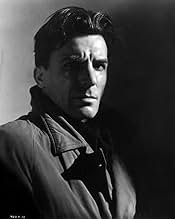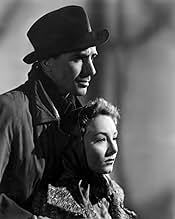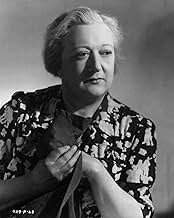Füge eine Handlung in deiner Sprache hinzuA train disaster is told as four short stories to give character studies of the people involved, how it will affect them, and how they deal with it.A train disaster is told as four short stories to give character studies of the people involved, how it will affect them, and how they deal with it.A train disaster is told as four short stories to give character studies of the people involved, how it will affect them, and how they deal with it.
Patric Doonan
- Ron Stacey (segment "The Engine Driver")
- (as Patrick Doonan/Patric Doonan)
Empfohlene Bewertungen
This is a not very widely known portmanteau film from 1949, in which four disparate stories are told, each culminating in the protagonists boarding a train to Liverpool, their stories becoming ever more enmeshed, only this train is headed for disaster.
I largely agree with Robert Temple's review (although there are spoilers and it is John Clements who plays the composer, not Gregson).
In contrast to many of the other reviews I found something rather good in all four stories, be it drama, witty dialogue, or humour. I thought it was all rather well done actually. For me, the standout performance was probably that of Peter Finch, who looked gaunt and utterly riven throughout.
In addition to the intriguing structure of the film -which has surely acted as an example to later directors- this film has interest today because it shows many street scenes in London and various scenes shot on the railways; who would have thought the age of steam would be over about fifteen years after this?
Anyway whilst some of the facets of this film will be lost on some folk, overall I thought it a pretty good effort, deserving to be better known and more widely appreciated than it is. Eight out of ten from me.
I largely agree with Robert Temple's review (although there are spoilers and it is John Clements who plays the composer, not Gregson).
In contrast to many of the other reviews I found something rather good in all four stories, be it drama, witty dialogue, or humour. I thought it was all rather well done actually. For me, the standout performance was probably that of Peter Finch, who looked gaunt and utterly riven throughout.
In addition to the intriguing structure of the film -which has surely acted as an example to later directors- this film has interest today because it shows many street scenes in London and various scenes shot on the railways; who would have thought the age of steam would be over about fifteen years after this?
Anyway whilst some of the facets of this film will be lost on some folk, overall I thought it a pretty good effort, deserving to be better known and more widely appreciated than it is. Eight out of ten from me.
Compenium films such as these were very popular in the late forties.Naturally their success rides and falls on the quality of the story.Alas in this case only one of the stories is worth telling.The Valerie Hobson/John Clements story is truly awful.Jack Warners domestic problems seem more like an episode of the Huggetts.The ex German POW story has some promise but becomes repetitive.The Peter Finch/Mary Morris story is quite good but is undermined by the somewhat ridiculous proposition that a murderer would cart the dead body of his wife around in a theatrical basket.The fact that there is a good cast,and a strong band of writers and directors make it all the more disappointing.The most interesting aspect of the film is the considerable location work,which includes a view of the late lamented Euston arch.
The film starts with a train crash and then spends its bulk describing 4 separate situations that leads to various characters being on board the doomed train. We then return to the crash and see its aftermath.
Sounds better than it is. The film starts impressively with the force and speed of the train filmed very dramatically. This is far and away the best part of the film and provides a very powerful opening. As we meet the characters, the film gets boring and sadly, that awful unfunny British humour rears its ugly head in a couple of scenes. Trying to endear the audience to old guys by getting them to imitate a chicken or a goldfish just isn't funny to me.
Aside from the naff comedy, the cast aren't very good. This is because either the characters are weak, such as Joan Dowling (Ella), to the point where we don't care about her fate, or else they are just difficult to like. A case in point is pretty much everyone else apart from Valerie Hobson (Stella).
Pianist Irina Baronova (Irina) and composer John Clements (Raymond) are painfully embarrassing and it's all a bit of an anti-climax when so many of this dull ensemble actually survive what looks like a crash that should have resulted in many more fatalities. Oh well, better luck next time! The film scores for the excellent beginning and a confrontational scene between husband and wife Peter Finch (Philip) and Mary Morris (Louise). If the film had concentrated on developing this story in a dramatic fashion, I would be talking about a much better film. But even this little vignette is ruined by absurdity as demonstrated by what Peter Finch decides to pack in his luggage. In his LUGGAGE! To take with him! Dumb film.
Sounds better than it is. The film starts impressively with the force and speed of the train filmed very dramatically. This is far and away the best part of the film and provides a very powerful opening. As we meet the characters, the film gets boring and sadly, that awful unfunny British humour rears its ugly head in a couple of scenes. Trying to endear the audience to old guys by getting them to imitate a chicken or a goldfish just isn't funny to me.
Aside from the naff comedy, the cast aren't very good. This is because either the characters are weak, such as Joan Dowling (Ella), to the point where we don't care about her fate, or else they are just difficult to like. A case in point is pretty much everyone else apart from Valerie Hobson (Stella).
Pianist Irina Baronova (Irina) and composer John Clements (Raymond) are painfully embarrassing and it's all a bit of an anti-climax when so many of this dull ensemble actually survive what looks like a crash that should have resulted in many more fatalities. Oh well, better luck next time! The film scores for the excellent beginning and a confrontational scene between husband and wife Peter Finch (Philip) and Mary Morris (Louise). If the film had concentrated on developing this story in a dramatic fashion, I would be talking about a much better film. But even this little vignette is ruined by absurdity as demonstrated by what Peter Finch decides to pack in his luggage. In his LUGGAGE! To take with him! Dumb film.
10clanciai
This is so much better than all the mass of train thrilers, all excellent and outstanding in suspense, while this one is no thriller but all perfectly natural, telling the stories of very ordinary people om board a train heading for disaster. The character you will remember best and forever is probably Peter Finch in his first film role as a Shakespeare actor in a truly tragic part, having lost his life and soul in six years of war and being constantly betrayed by his wife. His story is a drama in itself, while the other three destinies that are being followed are easier to digest, the story of the train driver, the story of a conceited conductor, his piano soloist and his wife, and the story of a German refugee, still suffering from the traumas of his past. Above all, the story is ingeniously conceived, weaving together four very different destinies, totally different from each other, none knowing anything about the others, and there are som police investigators as well, headed by Michael Hordern. There are so many dimensions to this film, the concert hall, the Shakespeare theatre, the domestic circumstances of the train driver and his family and friends, and the desperate circumstances of the refugee and his self-sacrficing girl getting their hardship exacerbated by a ruthless callous landlady. It's a pearl of cinematic invention, and the music adds to genuine quality as well. This is a film to enjoy and admire - and to have your compassion boosted with.
Although Jack Warner's domestic woes - or, more precisely, those of his daughter's boyfriend - keep getting in the way of far more meaty tales of murder, infidelity and post-war poverty this portmanteau movie from Ealing remains engaging throughout. A young Peter Finch receives his first screen credit as a murderer in the film's best story.
Wusstest du schon
- WissenswertesPeter Finch and Laurence Payne received "and introducing" credits.
- PatzerWithin the first minute and a half of the film the locomotive pulling the Euston to Liverpool express varies several times in cut shots from the largest 4-6-2 "Duchess" express locomotive to a variety of different, smaller 4-6-0 locomotives, variously with or without smoke deflectors, with single or double chimneys, with tapered or parallel boilers and with different numbers and tender insignias ("British Railways" or "LMS"). At one point a "Duchess" is seen again. Locomotive classes seen pulling the same train without it stopping thus include "Duchess", "Jubilee", "Patriot" and "Royal Scot".
- Zitate
Doris Hardcastle (segment "The Engine Driver"): Oh, it's you...
Ron Stacey (segment "The Engine Driver"): Well, don't overwhelm me ducks. I dunno as my poor old ticker'll stand it.
- VerbindungenFeatured in Remembering John Gregson (2019)
- SoundtracksThese Foolish Things (Remind Me Of You)
(uncredited)
Music by Jack Strachey and Harry Link
Lyrics by Eric Maschwitz
Sung by Leslie Hutchinson
Played in Philip's apartment
Top-Auswahl
Melde dich zum Bewerten an und greife auf die Watchlist für personalisierte Empfehlungen zu.
Details
- Laufzeit1 Stunde 28 Minuten
- Farbe
- Seitenverhältnis
- 1.37 : 1
Zu dieser Seite beitragen
Bearbeitung vorschlagen oder fehlenden Inhalt hinzufügen

Oberste Lücke
By what name was Train of Events (1949) officially released in Canada in English?
Antwort
































